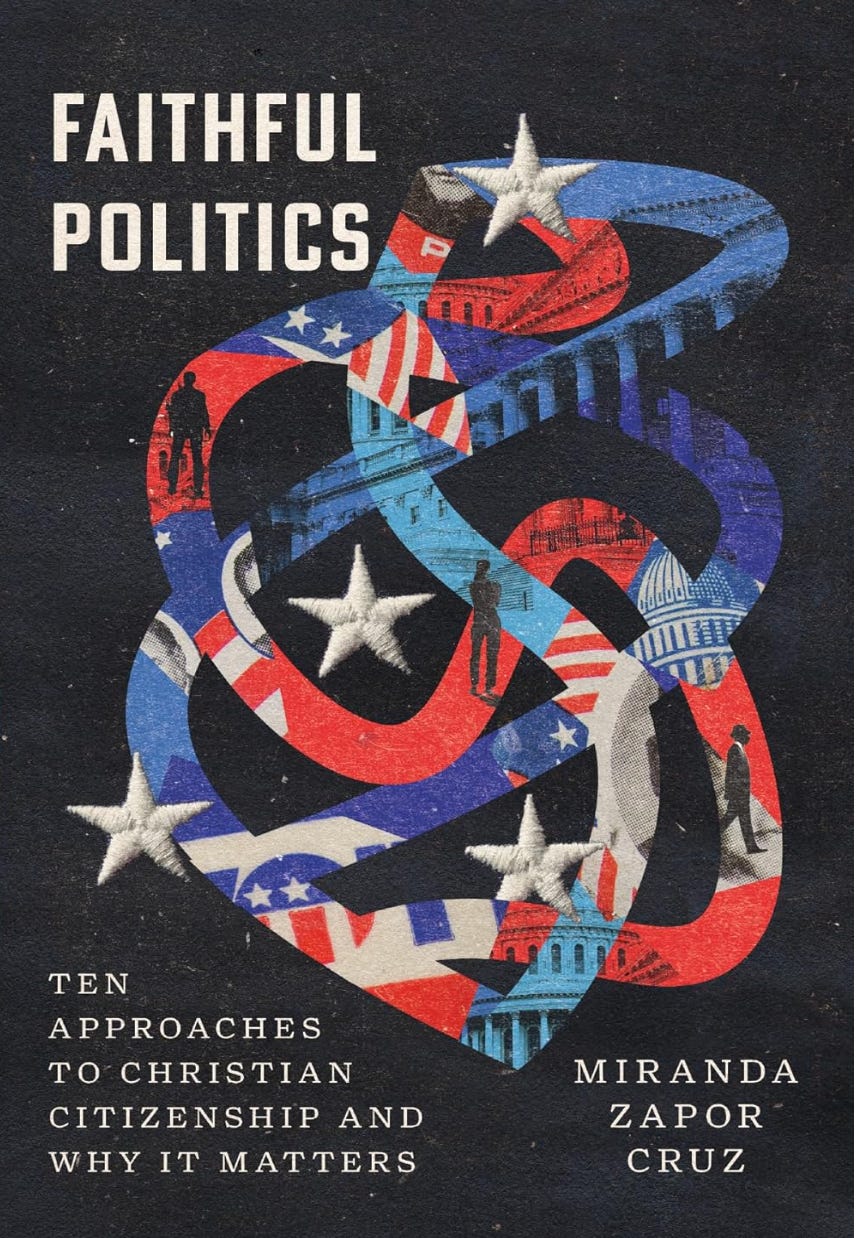The Common Good
A Christian who wants to map his or her life on the Bible’s teaching discovers that “rather than seeking biblical injunctions” that spell out in detail what to do and when to do it, “the Bible calls us to seek the Kingdom of God.” Sounds good, but the Spirit and discernment lead the way because that kingdom map provides direct implications for each us. So Amanda Zapor Cruz in her new book, Faithful Politics: Ten Approaches to Christian Citizenship and Why It Matters (Downers Grove: IVP Academic, 2024).
Here's my contention: The evangelical church in the 20th Century failed to form political discipleship. By that I mean, evangelicals have become a populist movement; evangelicals intuit themselves through elections; evangelicals do not think themselves through candidates; evangelicals listen to their gurus on for whom to vote. Evangelicals, in other words, do not have a well-thought-out theory of economics, of power, of race, of international relations, of toleration and difference, or of engagement.
Cruz calls for “dual citizenship,” which evokes several Christian traditions, from Augustine on, a citizenship in the kingdom, and this involves the following five categories:
1. Engaging with the government
2. Differentiating biblical Israel from the USA
3. Seeking the common good
4. Do kingdom work on earth
5. Discerning when to submit and when to resist
I put forward two distinctive early Christian approaches to these very issues, and these reveal that there was no single early Christian approach:
1 Peter 2:11-17, which we can call the strategy of submission.
Beloved, I urge you as aliens and exiles to abstain from the desires of the flesh that wage war against the soul. Conduct yourselves honorably among the gentiles, so that, though they malign you as evildoers, they may see your honorable deeds and glorify God when he comes to judge.
For the Lord’s sake be subject to every human authority, whether to the emperor as supreme or to governors as sent by him to punish those who do wrong and to praise those who do right. For it is God’s will that by doing right you should silence the ignorance of the foolish. As servants of God, live as free people, yet do not use your freedom as a pretext for evil. Honor everyone. Love the family of believers. Fear God. Honor the emperor.
Revelation 17:1-9, which we can call the strategy of resistance in graphic, even offensive, language:
Then one of the seven angels who had the seven bowls came and said to me, “Come, I will show you the judgment of the great whore who is seated on many waters, with whom the kings of the earth have engaged in sexual immorality and with the wine of whose prostitution the inhabitants of the earth have become drunk.” So he carried me away in the spirit into a wilderness, and I saw a woman sitting on a scarlet beast that was full of blasphemous names, and it had seven heads and ten horns. The woman was clothed in purple and scarlet and adorned with gold and jewels and pearls, holding in her hand a golden cup full of abominations and the impurities of her prostitution, and on her forehead was written a name, a mystery: “Babylon the great, mother of whores and of earth’s abominations.” And I saw that the woman was drunk with the blood of the saints and the blood of the witnesses to Jesus.
When I saw her, I was greatly amazed. But the angel said to me, “Why are you so amazed? I will tell you the mystery of the woman and of the beast with seven heads and ten horns that carries her. The beast that you saw was and is not and is about to ascend from the bottomless pit and go to destruction. And the inhabitants of the earth, whose names have not been written in the book of life from the foundation of the world, will be amazed when they see the beast, because it was and is not and is to come.
Of her above categories, I find number two and three very important.
It’s far too common to scrape a few texts from Deuteronomy and the Prophets, then salt and pepper it with some New Testament kingdom lines, and poof, a biblical approach. Most importantly, we cannot assume the USA and Israel are the same. What pertains to a covenanted-with-God people does not rule a pluralistic nation. While each citizen is privileged to advocate for what one believes to be right and good, one cannot impose the religious or spiritual realities of a covenanted people on those who want nothing to do with that covenant. Let’s be more direct: Many Christians in the USA today think the USA ought to be a Christian nation; many believe in returning to 18th and 19th Century (idealized) America; many believe in essence that what God told Israel is what God tells the USA.
Those of you know what I have written about kingdom of God will know that I think #4 is the Christian variation on identifying Israel with the USA. The USA is not the kingdom of God; kingdom work is redemptive work; kingdom people are Jesus followers; thus, at times doing kingdom work ends up imposing Christianity upon the nation.
Tell me, do you see this equation and, if you do, what do you think needs to be said?
Seeking the common good is for me the most important in her list for how to do the first category. I once heard a political theorist summarizes our two parties:
Republicans think what is good for me is best for everyone. That is, if each person looks to herself or himself, the result will be what is best for the most.
Democrats think what is good for everyone is best for me. That is, if each person thinks of the other instead of herself or himself, the result will be what is best for everyone.
Seeking the common good, then, can happen in two ways, but the goal is the common good.
I heard this from a professor of political science at one of the universities in the Dakotas. We were sitting next to one another on a plane.
It made an impression on me.
Thoughts?




This resonates with me. The statement, "Evangelicals, in other words, do not have a well-thought-out theory of economics, of power, of race, of international relations, of toleration and difference, or of engagement," is true. Very recently a relative I care about was ostracized due to simply asking question of a Christian brother regarding their theory of economics and power. The individual they sought to dialogue with became defensive (but did not answer the respectfully stated question). Rather than engage with my relative about the content, their response was to get irritated by the question and tell this relative, "You are wrong, but I can't say why because I'm not as good with words as you." Sadly, they were then blocked from communication and my relative's faith was questioned. This relative is a Jesus follower. Thanks for this writing today. It led to me gifting that relative with a subscription. It is refreshing that their are voices of Jesus followers who speak to these matters. I am grateful.
YES! Jesus pretty much defined common good, didn’t He - “The Jesus Creed”! I really like how the delineation of the two political ideologies was explained. As Peter Frampton said when he was inducted into The Rock and Roll Hall of Fame: “Kindness!’ Thank you for giving us Good things to think and talk about!